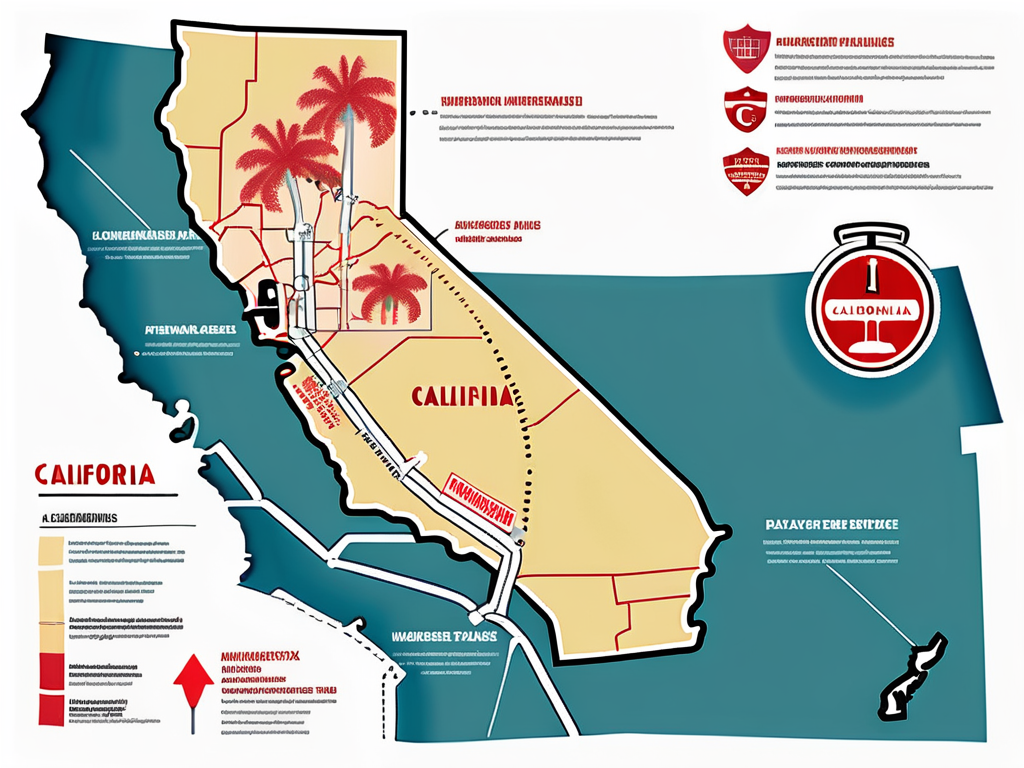This comprehensive guide aims to demystify California's business taxes and provide essential insights that can help you navigate through your fiscal responsibilities seamlessly.
rEAD MORE
Starting and running a business in California is an exciting venture, yet it comes with its own set of challenges, particularly when it comes to understanding the state’s business tax system. This comprehensive guide aims to demystify California's business taxes and provide essential insights that can help you navigate through your fiscal responsibilities seamlessly.
California is known for its vibrant economy and diverse business landscape. However, with this vibrant environment comes a complex tax system that requires diligence and a solid understanding. Business taxes in California can significantly impact your bottom line, and ignorance of the laws can lead to complications down the road.

Understanding business taxes isn’t merely about compliance; it’s about leveraging available opportunities for deductions and credits, which can lessen your overall tax burden. Being well-informed will empower entrepreneurs to make educated financial decisions. Additionally, California offers various resources and programs designed to assist small business owners in navigating the tax landscape, including workshops and online tools that can simplify the process of tax preparation and compliance.
There are several types of business taxes that California imposes. It is crucial for business owners to familiarize themselves with these to ensure compliance and optimize tax liability. The primary types include:
Each of these tax categories has its rules and regulations, which can be intricate and nuanced depending on the specifics of your business. For instance, the corporate income tax rate can vary based on the size and structure of the corporation, while the sales and use tax can differ from one locality to another, adding another layer of complexity for business owners operating in multiple jurisdictions.
Understanding these taxes is not just important for compliance; it can also provide strategic advantages. Proper knowledge allows businesses to budget accurately, plan for tax liabilities, and identify opportunities for savings through credits and deductions. Moreover, a solid grasp of the tax landscape ensures that businesses can avoid penalties and legal complications.
As tax regulations can change frequently, staying informed is imperative. This knowledge enables business owners to adjust their strategies in real-time, ensuring that they remain competitive and financially sound. Furthermore, engaging with tax professionals or consultants can provide valuable insights into evolving tax laws and help businesses navigate the often-complex filing processes, ultimately leading to more informed decision-making and better financial health.
The structure of California's business taxes is designed to cater to various forms of business entities and activities. Here, we will delve into some of the main components that govern business taxation in the state.
The state corporate income tax in California applies to businesses that are structured as corporations. The tax rate stands at 8.84% of net income, which is relatively high compared to many other states. This figure can be overwhelming for budding entrepreneurs but understanding how it’s calculated can mitigate surprises during filing.
Additionally, corporations may be subject to franchise taxes, which are annual fees for the privilege of doing business in California. Planning ahead and setting aside necessary funds for these taxes is vital for sustaining operations. It's also worth noting that corporations can benefit from various deductions and credits that may reduce their taxable income, such as research and development credits or incentives for hiring certain demographics. Familiarizing oneself with these opportunities can be a game changer for many businesses looking to optimize their tax liabilities.
California’s sales and use tax is another significant consideration for businesses. This tax exists at various rates depending on your locality and is imposed on the sale of tangible goods and certain services. Sales tax is collected from the consumer, which makes compliance manageable for businesses.
However, understanding the nuances—like exemptions and special district taxes—can be challenging. Businesses must also be aware of the requirement to report use tax on tangible goods bought for business use that did not have sales tax paid at the time of purchase. Moreover, the rapid evolution of e-commerce has introduced complexities in sales tax collection, especially for online retailers. As the state continues to adapt its tax policies to address the digital economy, businesses must stay informed about changes that could affect their operations and compliance requirements.
Property tax is levied on real estate and personal property owned by businesses. This tax is based on the assessed value of the property, and, in California, property taxes are determined under Proposition 13, which limits tax increases. Nevertheless, property taxes can still be a significant expense, so understanding how assessments work is important for businesses to budget accurately.
Keeping track of property value assessments and ensuring adherence to deadlines can help prevent surprises at tax time, allowing businesses to allocate financial resources more effectively. Furthermore, businesses should be aware of the potential for reassessment in cases of significant renovations or changes in ownership. Engaging with a property tax consultant can provide valuable insights into navigating these complexities and potentially identifying opportunities for tax savings through appeals or adjustments to property valuations.
Calculating business taxes accurately is crucial for maintaining compliance and fiscal health. This section involves knowing your taxable income and applying the correct tax rates.
Your taxable income is the foundation of calculating your taxes. This is defined as your gross income minus allowable deductions. Deductions can include operating expenses, employee wages, and other business-related costs. Understanding which expenses qualify is essential for minimizing taxable income.
Keeping meticulous records and utilizing accounting software can help streamline this process. Regularly reviewing and updating financial records will provide insights into your financial standing and help ensure that you accurately report your taxable income. Additionally, it may be beneficial to consult with a tax professional who can provide guidance on maximizing deductions and ensuring compliance with state regulations. They can also help identify any industry-specific deductions that you may not be aware of, which can significantly impact your overall tax liability.
Once you have determined your taxable income, applying the correct tax rates is the next step. California has a tiered tax structure for various types of taxes, which means rates can vary widely based on income levels and business structures.
Furthermore, be sure to stay updated on any changes to tax rates that could impact your business. This diligence can help avoid unexpected liabilities and enable you to formulate a more precise budgeting plan. It's also important to consider the implications of local taxes and fees, which can vary significantly depending on your business location within California. For instance, some cities may impose additional business taxes or licensing fees that could affect your overall tax burden. Understanding the full scope of your tax obligations will help you navigate the complexities of California's tax landscape more effectively.
California offers a variety of tax credits and deductions aimed at promoting business growth. Understanding and utilizing these opportunities can significantly reduce your tax burden.
Some notable tax credits include the California Competes Tax Credit, which incentivizes businesses to create jobs in California, and the Research and Development Tax Credit, which supports innovation and technological advancement. The California Competes Tax Credit is particularly beneficial for businesses looking to expand their workforce, as it provides a competitive edge in attracting and retaining talent in a state known for its high cost of living.
Moreover, other tax incentives may apply for businesses engaging in specific activities, such as manufacturing or green technology. For instance, the New Employment Credit is designed to encourage businesses to hire individuals from certain target groups, including veterans and the long-term unemployed. Researching available credits and understanding eligibility can lead to substantial savings, especially for startups and small businesses that may be navigating tight budgets.
Tax deductions can further help in reducing your taxable income. Deductions for business-related expenses such as office supplies, professional services, and travel expenses can substantially lower tax liability. It is crucial to keep accurate records and receipts to substantiate these deductions during tax filing. Additionally, businesses may also deduct expenses related to employee training programs, which not only enhance workforce skills but can also qualify for specific tax incentives.
Consulting with a tax professional can provide insights into maximizing deductions effectively and ensuring that you are compliant with all regulations. A knowledgeable tax advisor can help identify lesser-known deductions, such as those related to home office setups for remote workers or the depreciation of business assets, which can further optimize your financial strategy. Staying informed about changing tax laws and available credits can empower business owners to make strategic decisions that enhance their bottom line.
Proper filing and timely payment of business taxes play a crucial role in maintaining your business’s good standing with the state. Understanding the filing process can streamline this often-daunting task. Not only does it help avoid penalties, but it also fosters a sense of responsibility and accountability within your business operations, ensuring that you are contributing to the community and state services that support your business environment.
Business tax filing deadlines can vary based on the type of tax and business structure. Typically, corporations need to file their taxes by the 15th day of the 4th month after the end of their fiscal year. Staying informed about deadlines is essential to avoid late fees and penalties. Moreover, it's important to note that certain industries may have specific regulations that dictate different filing timelines, so always check for any unique requirements that may apply to your sector.
Utilizing tax calendar tools can help business owners remain organized and manage multiple deadlines effectively. This proactive approach allows you to ensure timely submissions and maintain compliance. Additionally, setting reminders well in advance of deadlines can provide you with ample time to gather necessary documentation and consult with tax professionals if needed, thereby reducing stress during peak filing periods.
California offers several methods for businesses to pay their taxes. Electronic payments through the California Franchise Tax Board (FTB) website are encouraged, as they provide a secure and efficient way to manage payments. Furthermore, businesses can also opt for direct debit options, which can automate the payment process and help avoid missed deadlines.
Understanding the nuances of payment procedures can prevent unnecessary delays. Additionally, if an unexpected cash flow issue arises, knowing the available payment options in advance can be advantageous. For instance, businesses may qualify for installment agreements that allow them to pay their taxes over time, easing the financial burden during challenging periods. Familiarizing yourself with these options not only prepares you for unforeseen circumstances but also empowers you to make informed financial decisions that can benefit your business in the long run.
Failing to meet tax obligations can lead to significant penalties and interest. Understanding the consequences of late or incorrect payments is essential for every business owner.

California imposes interest and penalties on any late tax payments. The interest accrues daily, making timely payments crucial to avoid compounding costs. Penalties can also be assessed for incomplete or incorrect filings, emphasizing the importance of accuracy in your submissions.
Businesses should establish a tax compliance schedule to ensure that all obligations are met on time, thereby minimizing the risk of incurring penalties. This schedule should include key dates for estimated tax payments, filing deadlines, and reminders for necessary documentation. By keeping a proactive approach, business owners can avoid the stress and financial strain that often accompanies last-minute tax preparations.
Common tax mistakes can range from simple arithmetic errors to more complicated misfilings. Regular training and updates on tax laws for your accounting team, or hiring experienced professionals, can drastically reduce the occurrence of errors. Furthermore, utilizing accounting software that is regularly updated to reflect current tax regulations can help streamline the process and reduce human error.
Additionally, double-checking all forms and documentation prior to submission can save considerable time and resources, promoting a healthier financial environment for your business. It’s also beneficial to maintain organized records throughout the year, as this can simplify the preparation process and ensure that all necessary information is readily available. Implementing a checklist for tax preparation can serve as a valuable tool to confirm that all aspects of the filing are complete and accurate, thus safeguarding against potential pitfalls that could lead to penalties.
As tax laws evolve, many business owners find it beneficial to seek professional help. Tax professionals provide expertise that can lead to better compliance while optimizing tax outcomes. They stay updated on the latest changes in legislation and can offer insights into how these changes might impact your business. This proactive approach not only helps in avoiding penalties but also opens doors to potential tax credits and deductions that you may not be aware of.

Consider hiring a tax professional if your business is growing rapidly, has multiple revenue streams, or if tax issues become overwhelming. Additionally, if your business is subject to different state and local tax obligations, a professional can navigate these complexities more effectively. For instance, if you operate in multiple states, understanding the nuances of each jurisdiction's tax requirements can be daunting. A tax professional can help ensure that you are compliant with all regulations while maximizing your tax benefits.
Ultimately, investing in professional advice can yield significant returns through tax savings and strategic planning. A skilled tax advisor can also assist in forecasting future tax liabilities, enabling you to make informed financial decisions that align with your business goals.
Finding a tax advisor who understands your unique business needs is crucial. Look for someone with experience in your industry, strong communication skills, and a good track record with businesses similar to yours. This partnership can provide peace of mind in navigating the intricate landscape of California's business taxes. Additionally, consider the advisor's approach to client relationships; a good tax professional should be willing to educate you about your tax situation and empower you to make informed decisions.
Whether you are looking for assistance with filing, planning, or compliance, the right tax advisor can be an invaluable asset to your business. They can help you implement effective tax strategies that align with your overall business strategy, ensuring that your financial health is prioritized. Furthermore, a proactive tax advisor will not only react to your current needs but will also anticipate future challenges, allowing you to focus on growing your business while they handle the complexities of tax management.
Being audited is comparable to being struck by lightning. You don't want to practice pole vaulting in a thunderstorm just because it's unlikely. Making sure your books are accurate and your taxes are filed on time is one of the best ways to keep your head down during tax season. Check out Vincere's take on tax season!

This post is just for informational purposes and is not meant to be legal, business, or tax advice. Regarding the matters discussed in this post, each individual should consult his or her own attorney, business advisor, or tax advisor. Vincere accepts no responsibility for actions taken in reliance on the information contained in this document.
Copyright © 2025 Vincere Tax| All Rights Reserved
Privacy Policy